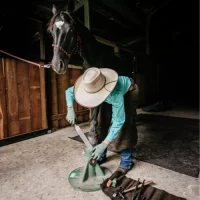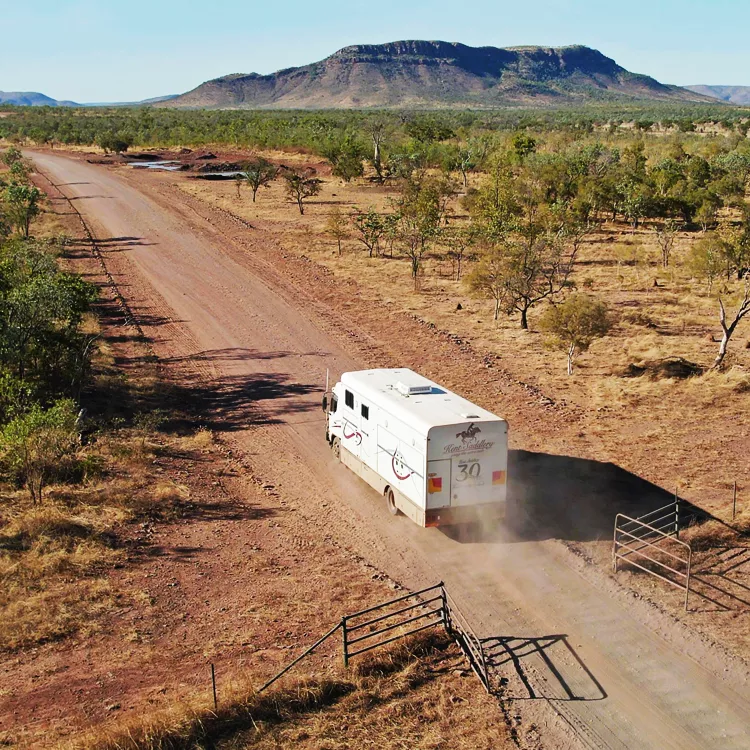Billy Forrester – An Outback Life
Billy Forrester is a man who, once met, you’re unlikely to forget. Small in stature, with a big heart, and strong convictions, he is passionate about the things in which he believes.
We’ve known Billy since 1991, and our respect and admiration for him continues to grow. Billy, with wife Lisa and their three sons Bud, Dusty and Brumbie always welcomed us at Kimberley Downs, north of Derby, WA where Billy was manager from 1999 until 2007. Billy, Lisa and boys are currently living in Derby.
Billy is a stockman through and through and readily admits, “I’ve spent all my working life on stations. Even as a kid, in the Christmas holidays, I’d take off to Turree Creek Station near Meekatharra, WA”, where he spent his childhood.
At 13, he was expelled from school, and he describes himself at that time as uncontrollable!” Predictably, within a fortnight of leaving formal education, he’d begun work in a stockcamp.
He spent most of his teenage years in the deserts of Wiluna, WA where Billy remembers “You could go 1500 miles and not open a gate”. In the cattle camps on Wongawol Station they relied on pack horses, and hobbled out 80 or 90 horses – that’s how it was in the 60’s.
Billy has an incredible memory for places, times and people, and his life story is crammed with vivid descriptions of events, peoples’ names, and specific dates. The so called “uneducated” like Billy, often possess on amazing ability to recall detailed accounts of all kinds of life experiences.
Billy not only tells a story, he often gets to his feet, acts it out, and involves himself and the audience in the memory.
His story telling reveals his headstrong nature, the consequences of which carried him from one side of the country to the other, when he “couldn’t see eye to eye” with certain people, or decided it was “time to leave that neck of the woods” because of difficult ircumstances.
Consequently, as a young man he found work from Queensland to Arnhem Land, and Alice Springs to Derby. He picked citrus fruit, worked on road construction, and also spent time in the gold mines at Meekatharra. He spent 10years around Alice Springs and loved it down there. However, it was too cold for his liking, and the West beckoned him back home, to see his family and return to the country he loved.
Billy’s story can’t be told without including an underlying story; an account of his victory in the battle with alcoholism. With characteristic openness, Billy says “Why I started drinking, I would not have a clue. It just seemed to grow on me. I was always kind of shy and with beer in me I would lose all my shyness. I used to get a lot of confidence from alcohol. Alcohol works on you, like poisoning, a disease. One drop leads to another, and another.” As the drinking increased, so did the nightmare experiences of the horrors.
Jobs were getting shorter, and drinking binges were getting longer. Relationships with family and friends deteriorated, and Billy, at the time caretaking at Birrindudu Station, was at the point of suicide.
For Billy, Warren Kowoski, the manager at Nicholson, was the man at the right place at the right time. He was organising a “Merry Muster” at the station – a collective meeting for Alcoholics Anonymous. Billy went to the meeting, and says “I thoroughly enjoyed it”, and he has never touched grog since. It took him three years to adjust, and it was hard, but now it doesn’t worry him.
Asked if he has an occasional beer, Billys’ spirited reply is “No, definitely not! NO!” Beer has been replaced by black tea, and anyone who knows Billy Forrester knows that he carries a thermos everywhere he goes, and at home a big pot is always on the brew!
Lisa is a quietly determined companion to her Bill, and she and the boys are the family that Bill loves, and the main reason he is determined to stay grog free and also beat the other addiction – smoking! He’s working on it!
Talking about horses, Billy’s eyes light up, is voice becomes louder, and passionately he exclaims “They’re the love of my life!” Of the cattle industry, Billy is equally animated when he shares the insights he’s gained with involvement in low stress cattle handling. He’s convinced the markets prefer, and will increasingly demand quiet cattle. Of equal importance, low stress handling is good for the cattle, and for the young people coming to work in the cattle industry. Taught properly, low stress handling takes the fear from the cattle, and the workers, and the job becomes satisfying and enjoyable. Low stress handling also involves horses – working the cattle slowly and quietly, and Billy is optimistic that the use of horses will increase as low stress cattle handling gains in acceptance and application. It’s a privilege to know Billy and be regarded as his friends. We hope he continues to use his knowledge, experience and ability to encourage, inspire and enrich the lives of others. “
Image captions:
1) Billy Forrester
2) Bronco branding panel and horse collars
3) Billy and Lisa with Brumbie and Dusty















